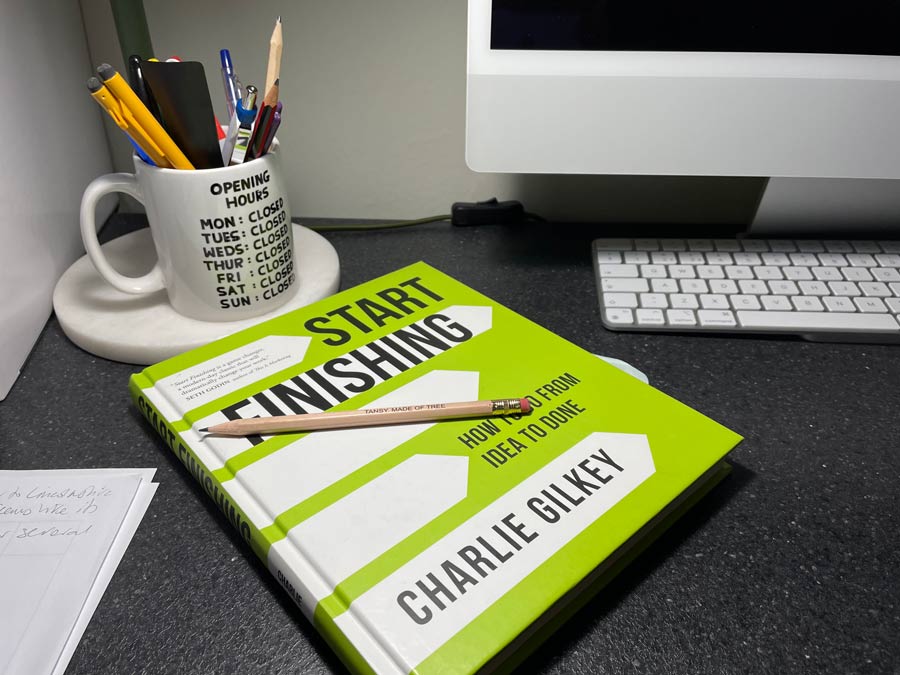In the political and social chaos that infected this autumn, I found myself seeking some focus. With many competing ideas, distractions and the temptations of doom-scrolling, I needed a little help to work out where to direct my energy.

Do we really have all the time in the world?
Charlie Gilkey’s ‘Start Finishing’ and Oliver Burkeman’s ‘Four Thousand Weeks’ take different approaches to the same problem – how to do what’s important to you in the time you have. These two books gave me some unexpected answers. They taught me that I, like so many of us, am just one person trying to do far more than is possible. Since you might be trying to do this too, I thought I’d share what I’ve learned from them.
How to finish what you’ve started
‘Start Finishing’ is a book about productivity with an unusual message – you don’t have time to do everything. It encourages us to say no to things which aren’t really so important, to let go of projects which aren’t in line with what we really want from life.
As a creative minded person this is a very difficult message to take on board – when all things seem possible and potentially exciting, it’s very hard to let any idea go. He suggests that we have capacity for a maximum of 5 projects at a time and that could include raising children, doing up a house or learning a new skill as well as what we might be more familiar with as projects, like making art.
The book is full of very practical advice and a solid system for breaking down big projects into smaller chunks. I’d say you would need to put a significant amount of time into the planning stages of any project to make this system work, but I can see that it would be an excellent way of making sure the work actually gets done.
The most immediately useful idea I’ve taken from the book is that of timeblocks, a portion of time dedicated to a particular type of task. Focus blocks are when you have the mental energy to tackle deep work and I’ve found that mornings are definitely my most productive time. I’ve been making sure I go straight to the studio first thing instead of getting distracted by emails and adminy things and this has really paid off.
Personally the detailed ‘chunking’ makes me feel a bit bored with the whole idea but that’s just me rebelling at being told what to do, even when it’s me doing the telling! If you like working through a task list then you’ll love his approach to making the small tasks add up to something big. I’m still trying out the system though and really embracing the first stage of choosing what to let go of. Let’s just say there’s a lot in the “one day I’d like to…” pile.
Things take the time they take.
On to the second book which I listed to on audio while redecorating my living room. Here’s one of my woodland drawings in my new dark blue cosy corner.
 Oliver Burkeman’s ‘Four Thousand Weeks’ is a more philosophical read/listen with some big ideas to shift your whole relationship to time.
Oliver Burkeman’s ‘Four Thousand Weeks’ is a more philosophical read/listen with some big ideas to shift your whole relationship to time.
Time as we in the western world understand it, is a recent construct linked to industrialisation and only slightly connected to how we actually experience it.
Productivity gurus sell a lie – you can’t make time or spend it. The average human lives for about 4000 weeks. This is all the time we have (if we’re lucky) but we never really HAVE it. So we can choose how we occupy ourselves in this time, but are creating a great deal of pointless anxiety about not getting enough done, constantly measuring our output against a notional idea of what can be achieved in any given time. Projects always overrun. If you schedule contingency time for things overrunning, you will overrun this too. And so on.
My overall impression of this book is that it’s a deeply compassionate look at how time constraints negatively affect our lives. My takeaway from it is to keep reminding myself that I’m always wildly over optimistic when planning and that if I’m lucky I might manage a quarter of what I thought I would in any given time period.
The author reads his book beautifully and it’s full to the brim with personal yet universal wisdom. I’ll be going back to it more than once I think, as it’s the kind of book that you absorb rather than read and let go of.
What this time taught me
Both these books made me re-evaluate my focus. Actually they made me realise I was quite unfocused, with my attention being divided by far too many different things. So my current ‘project’ is to focus on one thing at a time, to say no to new projects unless I let go of an existing one and to accept that things just take the time they take. Unexpected events will disrupt and divert me, things will go wrong, other people will delay progress, but that’s ok because that’s just life.
 I’m skipping the doom-scrolling and focusing on what’s really important instead. There will be more time in the studio and in the woodland, and more time spent noticing beautiful things like these shadows on my washing.
I’m skipping the doom-scrolling and focusing on what’s really important instead. There will be more time in the studio and in the woodland, and more time spent noticing beautiful things like these shadows on my washing.
Wish me luck!